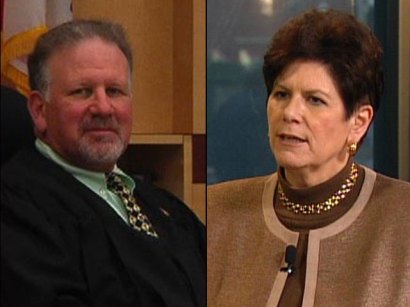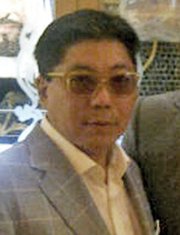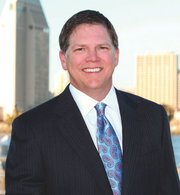District Attorney Bonnie Dumanis has closed out her campaign committee, Bonnie Dumanis for District Attorney, but not before raising enough money from local fat cats to pay off the $6500 balance on a $20,000 loan at 9.5 percent from Bank of America that was secured by her personal residence and made to the Dumanis committee back in October 2002.
According to a campaign filing with the county registrar of voters dated this April 8, in addition to the loan payoff, the committee made other payments of $2487 before closing up shop. Recent contributions made to the Dumanis fund, most on March 16 of this year, included those from undersheriff Bill Gore; property mogul Malin Burnham; Pacific Company’s Ashok Israni; Atlas Hotels chief C. Terry Brown; developer Pat Kruer; ex-Pete Wilson intimate John Davies; and multiple-unit owner Conrad Prebys.
__________________________________________________________________________________________________________
Dumanis to dispose of more donations Some will be returned, some given to charity
By Trent Seibert 9:40 P.M. JAN. 28, 2014
 Bonnie Dumanis appears on U-T TV on Monday to discuss the campaign finance probe. — John Gastaldo
Bonnie Dumanis appears on U-T TV on Monday to discuss the campaign finance probe. — John Gastaldo
District Attorney Bonnie Dumanis will dispose of thousands more dollars given to her campaigns by figures connected to an ever-widening political corruption case, a spokeswoman said late Tuesday.
Dumanis will return $1,400 given to her re-election campaign in May and June by the wife and a close business associate of José Susumo Azano Matsura, a Mexican national whose money federal prosecutors say was illegally injected into San Diego campaigns.
Dumanis will also dispose of about $10,000 linked to Azano and others involved in the scandal to her mayoral campaign in 2012 — by giving the money to charity, her re-election campaign said.
Dumanis will give the money out of her own pocket, something suggested by critics given that her mayoral campaign paid $26,000 to her when it closed in June, to repay money she had lent the effort.
“Bonnie’s motive in everything is to do the right thing,” Dumanis campaign consultant Jennifer Tierney said. “She believes this is the right thing to do.”
The charity has not been selected yet, but “it will be something focusing on crime victims,” Tierney said.
Tierney said the amount of the donation has not been finalized. The Watchdog this week
identified 27 different contributions to her campaigns from associates and relatives of three central figures in the campaign finance scandal.
Federal prosecutors say a former vice officer, political consultant and lobbyist conspired to pour $500,000 of Azano’s money into local campaigns, an illegal act because foreign nationals cannot give to U.S. campaigns.
As the case unfolded last week, Dumanis returned $1,400 given to her re-election campaign by one of the men charged in the case, former police Officer Ernesto Encinas, and his wife.
On Monday of this week, she told the U-T she would not be returning any more funds, even as she was presented with a complete list of contributions tied to the figures in the scandal. She said no refunds were possible because her mayoral account was closed out and further, she said, she lacked the personal funds to do so.
On Tuesday, her campaign said, the Dumanis team conferred with the San Diego Ethics Commission about how to release the funds.
“It’s not that it was a change of mind,” Tierney said. “Until we contacted the Ethics Commission, we didn’t know this possibility was open to us.”
The San Diego Ethics Commission, according to Tierney, told the Dumanis campaign that giving unwanted money to a charity would allow them to dispose of the money. The commission oversees campaign rules, saying what campaign committees are allowed to do with contributions.
Contacted late Tuesday, Ethics Commission Director Stacey Fulhorst said she couldn’t comment on Dumanis’ decision.
“Commission policy does not allow us to discuss advice we provide specific individuals,” Fulhorst said.
The method Dumanis chose to dispose of the funds may say something about the nature of the contributions.
If a candidate believes he or she has been given funds illegally, those funds must be handed over to the city clerk pending investigation. If a candidate has other reasons for returning the funds, they can be returned to the donor or given to charity.
Dumanis maintained on Monday that the funds were legal.
“Money that was received to the campaign is legal,” Dumanis told The Watchdog on Monday. “All of that money was legally received.”
Dumanis benefited substantially more from the foreign money than the money given directly to her campaign committees. Most of the money — $200,000 — was spent outside Dumanis’ control by independent committees or companies operating on her behalf. She does not control the committees and could not return the money.
___________________________________________________________________________
No different than San Diego District Attorney Bonnie Dumanis and how she bought off the lab, promised the guy a job, brought him to San Diego, all on the backs of a young mom they fraudulently, criminally, put in jail, so bad was this that the Judge in the case (where this young mom sued San Diego) said that Dumanis knew, or should have known that this young mom was innocent of murder, but Dumanis still put her in jail so that Dumanis could further her own carrier into the California state Attorney General. How is this woman even still District Attorney, and why did no one run against her. These DA's are so corrupt, the corruption has spilled from Washington all the way down the line. Dumanis needs to be recalled, but be careful, they may try to take you out if you try to.
DENVER -- An internal review of the state crime laboratory, which concluded in March but was only released on Friday, reportedly found that the supervisor...
Written by Chris
February 19th, 2010
 Judge Harry Elias and DA Bonnie Dumanis
Judge Harry Elias and DA Bonnie Dumanis
Recently San Diego County Superior Court judges including Judge Harry Elias have chastised prosecutors for the San Diego District Attorney’s office for violating the law by withholding potentially exculpatory evidence. He and other judges have dared to make decisions the DA didn’t support. DA Bonnie Dumanis thinks she knows how to handle such judges — refuse to try cases before them and try to push them out of criminal courts. Dumanis seemingly thinks the DA can control judges to make them do what she and her prosecutors want them to do by threatening their careers. But this is a clear violation of the separation of judicial and executive branches of government. It is also directly opposed to the interests of the public to ensure that citizens accused of a crime are given a fair and impartial trial.
Bicycle Theft: Prosecutors Hid that Fingerprint Doesn’t Match
Journalist Catherine Garcia of NBC San Diego has covered the problems cited by Elias in which prosecutors withheld evidence that showed fingerprints did not match the accused. Prosecutors say they have no obligation to disclose the existence of inconclusive fingerprint comparisons. Judge Elias did not agree.
In a recent bicycle theft trial, in which the defense argued the verdict should be overturned because of problems with discover, Judge Harry Elias criticized the prosecutors’ handling of fingerprint evidence and said the DA’s office has a bad reputation among some defense attorneys, and other judges.
Prosecutors, who insist they did absolutely nothing wrong in that case, filed a motion demanding Judge Elias should step down from the case because those comments reveal “a clear mindset of bias and prejudice.”
Judge Elias made a quick and very forceful decision at a hearing this week. He said he’s done absolutely nothing wrong, and will stay on the case.
Wrongful Conviction for Murder by Arsenic Poisoning
This isn’t the first time San Diego law enforcement has hidden evidence that cast doubt on the guilt of the accused. Another boycotted jurist, Judge John Einhorn, in 2008 was confronted with the “discovery” that new testing on the dead body of Todd Sommer who was supposedly killed by his wife via arsenic poison, a crime for which she was convicted, showed there was no arsenic present.
Over the past year, Einhorn has been at the center of two of the higher profile cases in San Diego. Sommer was convicted of murdering her husband, Todd, in 2007 by poisoning him with arsenic. She was granted a new trial in November of that year. Then in April 2008, new evidence was discovered — tissue samples of Todd Sommer that showed no traces of arsenic — and that led to prosecutors dismissing the case.
The retrial had been assigned to Einhorn. Allen Bloom, Sommer’s lawyer, pressed for the case to be dismissed in a way that would preclude prosecutors from ever charging Sommer again.
Cynthia Sommer was convicted of the murder based largely upon circumstantial evidence. Such “evidence” included her spending habits, that she received a life insurance payout, and got new breast implants and attended wild parties after her husband’s death. There was no evidence to show that she ever obtained arsenic.
Speculation is that the initial tests that showed very high levels of arsenic were due to contamination. A defense expert witness testified that the initial tests showing arsenic levels 1020 times normal were physiologically improbable and inconsistent. Given the track record of the district attorney’s office, one wonders if the evidence was really inadvertently contaminated.
San Diego DA: Pattern of Hiding Exculpatory Evidence
Judge Elias has stated the some San Diego judges believe the DA’s office is intentionally and deliberately withholding exculpatory evidence. As Greg Moran of the San Diego Union-Tribute reports:
The veteran judge said at the time that the reputation in the courthouse of the prosecutor’s office was “not good,” largely because of several other cases in Vista in which evidence that should have been given to the defense was not.
Elias said some judges believe those to be “deliberate and intentional” omissions, which the District Attorney’s Office vigorously disputes.
The dispute erupted after Bowles’ conviction for burglary and theft. During a second, shorter trial to prove that Bowles had committed two previous “strike” offenses that would increase his sentence, defense attorney Sherry Stone contended that a forensic analysis of a single fingerprint on a pawnshop slip had not been disclosed.
Analysis of the print showed that it was inconclusive and could not be linked to Bowles. Numerous other prints on evidence, however, were connected to him and included in a written report. The defense contends that omitting information of the inconclusive print from a report on the fingerprints was wrong. Prosecutors say the information was included in a different exhibit and that there was no obligation to say so in the report on all the prints.
Dumanis Boycotts Judges to Bully Them
Writer Kelly Thornton of the Voice of San Diego recently published an article on what Dumanis & Company are trying to do to local judges who don’t do what they want.
The San Diego County District Attorney’s Office has threatened to boycott another Superior Court judge over rulings that prosecutors found troubling, according to a personal account from the judge in question.
Laura Parsky, the third judge in four months to be targeted by the district attorney, related details of the possible boycott during a court hearing in a domestic violence case Jan. 15.
Parsky said it was her ethical duty to disclose that a district attorney supervisor had complained to the supervising judge in Chula Vista about some of her rulings, including decisions she made in the still-pending domestic violence case. The supervising judge, who handles ministerial matters such as assigning cases to other judges, then relayed these concerns to Parsky, along with a warning that the District Attorney’s Office may seek to disqualify her in future cases.
It is considered unethical for a party in a pending case to have communications with the judge without the other parties present. Although the prosecutor and Parsky had no direct communication in this case, Parsky was so concerned about the implications of the exchange that she consulted a state judicial ethics panel and was advised to formally disclose it.
She did so at the next hearing in the domestic violence case of defendant Michael Barron.
“The supervising attorney from the District Attorney’s Office … advised the supervising judge that the district attorney’s office may be exercising peremptory challenges against me based on that ruling and others,” Parsky said, referring in part to decisions in the Barron case.
Her comments are contained in a court transcript of the hearing. Barron’s defense attorney, Lynn Ball, subsequently filed a motion to disqualify the District Attorney’s Office because of “arrogant misconduct.”
Writer Randy Dotinga of the Voice of San Diego discussed the mechanics of how the DA is boycotting judges using peremptory challenges:
For months now, an unexplained edict from District Attorney Bonnie Dumanis has forbidden county prosecutors from bringing new criminal cases before one particular Superior Court judge.
What gives? Can the DA just wave her hands and — voila! — a judge is blackballed? Yes.
It’s that simple, and it’s apparently been done before here.
But there are risks to boycotting a judge, and one expert suspects that Dumanis won’t play this card for long.
“I don’t think the office can afford to waste this free challenge in every single case,” said Jan Stiglitz, co-director of the California Innocence Project.
He’s referring to what he calls a “freebie” — the opportunity for a prosecutor or defense attorney to reject a judge in a criminal case without specifying a reason. It’s known as a peremptory challenge.
Elias Throws Out Trial Due to Prosecutorial Misconduct
Judge Elias may be targeted for more boycotting by Bonnie Dumanis. He’s dared to throw out the trial of Kenneth Bowles because he believes the prosecution willfully and intentionally withheld exculpatory evidence.
In a 15-page ruling, Elias concluded that evidence of an inconclusive fingerprint match on a pawnshop slip that was part of the evidence against Bowles should have been given to defense attorneys.
Bowles had argued he was at a different pawnshop at the time the bicycle was taken. But prosecutors tied Bowles to the theft of the bike, relying in part on the pawn slip with the fingerprint that was determined to be inconclusive, Elias noted.
The case caused a stir in the courthouse because defense attorneys say it is an instance of failure to disclose key evidence, which has happened on several occasions.
Elias did not dismiss the case entirely, concluding that other evidence linking Bowles to the crime was strong enough that he probably would have been convicted. He also let one guilty verdict stand.
But Elias was not willing to excuse what he said was “willful omission of exculpatory evidence” that could have been favorable to Bowles’ defense. As a further penalty, he said prosecutors could not use the pawn slip as evidence in the retrial.
Bonnie Dumanis: A Threat to Innocent San Diego Citizens
While most citizens would like to see criminals punished appropriately, what Bonnie Dumanis and San Diego prosecutors are doing amounts to perverting justice and denying a fair trial to accused parties. The government already has huge advantages over anybody it accuses of a crime. It has nearly unlimited resources to fabricate, plant, and alter evidence. It can also hide evidence that doesn’t support accusations. Defendants deserve access to all of the real evidence, but they are not getting it due to prosecutorial misconduct.
It appears Bonnie Dumanis and her cohorts deny access to evidence because they believe that a “win” for the prosecution is more important than a fair trial and justice being served. In doing so and by then whitewashing these problems, Bonnie Dumanis has shown her true character and revealed that she’s not a suitable person to be heading the San Diego District Attorney’s office. The public would do well to remember that when considering whether to vote for her again.
__________________________________________________________________________________________________________
by DOUG PORTER on JULY 9, 2014 · 8 COMMENTS
By Doug Porter
San Diego County District Attorney Bonnie Dumanis appeared on KUSI-TV’s morning talk show today to release a copy of her letter of recommendation written for the son of indicted Mexican financier Susumo Azano.
A consortium of media organizations including City News Service, inewsource, KFMB News 8, KNSD/NBC 7, KPBS, KSWB/Fox 5, the San Diego Daily Transcript, San Diego Press Club, Society of Professional Journalists San Diego, U-T San Diego, and Voice of San Diego had made repeated requests for a copy of the document.
At 5pm yesterday a deadline passed for what was essentially a demand letter (the last thing you do before you sue somebody) written by attorney Guylyn Cummins on behalf of the media organizations.
KUSI, it turns out, wasn’t one of those news organizations, apparently not wanting to displease a powerful prosecutor (whose office–wink,wink– can provide reliable news tips). Or maybe it’s just because the station is proud of their record of sucking up to politicians.
Financier Anzano has been indicted in an ongoing investigation focusing on $600,000 in illegal foreign cash ended up in local campaigns, including Dumanis’s failed 2012 run for mayor. The DA has repeatedly minimized her connections with the Mexican billionaire, even as more stories about her encounters with him have appeared in the media.
Dumanis stonewalled the media for weeks about the letter, who became aware of its existence following a courtroom appeal by political rival Bob Brewer who sought to have it released from evidence collected by federal prosecutors.
The reference was written on District Attorney’s letterhead in September 2012 on behalf of Edward Susumo Azano, who was seeking admission to the University of San Diego.
The letter may shed more light on the relationship between Dumanis and the Azano family. She has refused to release it, saying it’s not a matter of public business, and that she is protecting the student’s privacy.
Guylyn Cummins, the attorney representing the media organizations, said in her letter on Monday that those justifications are not valid under state open records laws.
The 8am interview (audio) with the DA was (accurately, in my opinion) described by one wag on Twitter as “performance art.”
 Dumanis proclaimed that media accounts of her obstinacy were “much ado about nothing.” The KUSI talking head agreed, saying the document “seems like a standard letter of recommendation.”
Dumanis proclaimed that media accounts of her obstinacy were “much ado about nothing.” The KUSI talking head agreed, saying the document “seems like a standard letter of recommendation.”
“I’m the only one that was open on this from the beginning,” Dumanis told KUSI, “I think it’s time to move on.”
The DA went on to say there were “two kinds” of recommendation letters, one issued when “someone I know personally asks” and another when “some one I know” asks for a letter. She even tried to make the point that the letter for Anzano’s son was on less-than-official stationary. (It contained the DA’s seal, her name, phone number and the name of her title)
Even though the letter of recommendation was written four months after City Beat reporter Dave Maass revealed Anzano’s donations to a Super PAC supporting Dumanis, the DA sat up there at KUSI and said she had no reason to question the request.
Dumanis also apparently had no reason to remember the letter when Maass filed a public records request for all documents relating to “Susumo Azano” one month after she’d signed it. Even if she’d opted not to release the letter as part of the request, the law says the DA’s office should have given a reason. The fact is they simply didn’t acknowledge its existence.
So DA Dumanis’ brilliant public relations move just makes her look more sleazy.
Voice of San Diego has an excellent recap of stories about this campaign finance scandal. Here’s the second paragraph of their introduction:
Prosecutors say San Diego District Attorney Bonnie Dumanis was the first and last target of Jose Susumo Azano Matsura, a Mexican citizen who allegedly illegally funneled hundreds of thousands of dollars to Dumanis and other local candidates.
_________________________________________________________________________________
- The FBI said that Sempra may have violated the Foreign Corrupt Practices Act to get this liquid natural gas plant built near Ensenada.
By Don Bauder, March 12, 2014
Every time local media report that District Attorney Bonnie Dumanis got $200,000 in subterranean money, plus gifts, from Mexican tycoon José Susumo Azano Matsura, Dumanis’s election opponent, local attorney Robert Brewer, steps up his attacks on her.
But very few San Diegans know that it was Brewer who suggested, three years ago, that the United States government pursue Azano. Brewer was representing Sempra Energy, the parent of San Diego Gas & Electric. In early 2011, the Federal Bureau of Investigation concluded that there was sufficient evidence that “Sempra and its business executives may have engaged in criminal activity so as to justify the opening of a full investigation into possible violations of the Foreign Corrupt Practices Act,” according to documents that San Diego attorney Gary Aguirre got from the federal government through the Freedom of Information Act.
Former Sempra accountant Rodolfo Michelon had filed a whistle-blower complaint. Among many things, he charged that Sempra had set up a multimillion-dollar trust in Ensenada, built an expensive fire station in Tijuana that was quickly abandoned, and passed $100 bills to the governor of Baja California — all for the purpose of greasing the skids to build a liquefied natural gas plant near Ensenada. After complaining internally about these practices, Michelon had been fired. So he filed whistle-blower complaints with the federal government. Ultimately, he was rebuffed. Now, Aguirre and attorney Dan Gilleon represent him as he tries again.
Eugenio Elorduy Walther was governor of Baja in 2003. At the time, Marathon Oil was well ahead of companies wanting to build a natural gas plant there. Suddenly, around the time that Sempra wanted to build farther south, Baja condemned Marathon’s property. Marathon hired the prestigious law firm of Boies, Schiller & Flexner to investigate. The firm hired an international investigative operation, Interfor, to probe the activity. Interfor found that Elorduy had bank accounts in offshore havens: the Cayman Islands and Switzerland. Further, “Governor Elorduy has also been linked to giving preferential treatment to Sempra Energy,” said Interfor.
In response to the federal investigation, Sempra hired two outside law firms, allegedly to look into the matter. One of those firms was the San Diego office of Jones Day. That’s how Brewer, a partner in that office, got to be working for Sempra.
In early 2011, representatives of the Federal Bureau of Investigation and Securities and Exchange Commission, Michelon, Brewer, and others held meetings about Sempra’s possible bribery escapades in Mexico.
According to the redacted documents Aguirre received, the critical meeting was on February 16, 2011. One attendee said the FBI should investigate two individuals he believed were culpable. One of them had an arrangement to get 55 percent of monies that Sempra might pay to settle a dispute over the property near Ensenada. That had to be Azano: in a civil suit filed last year, Sempra complained that Azano had an arrangement to get a 55 percent cut of whatever Sempra might be forced to pay.
But who at that meeting pointed the finger at Azano? The finger-pointer “couldn’t have been anybody other than Bob Brewer,” says Gilleon, who was Michelon’s only lawyer at the time.
One of the key government attendees at the meeting was Charles La Bella, a former United States attorney in San Diego and the senior Department of Justice attorney at the meeting. La Bella had also been a partner at a law firm with Robert Brewer.
According to Aguirre, the federal government closed Michelon’s first complaint and did “little, if any,” field investigation. Jones Day, Sempra’s law firm, “selected and screened virtually all evidence” considered by the Federal Bureau of Investigation and Securities and Exchange Commission. “Neither agency carried out an independent investigation of the allegations,” says Aguirre in the second whistle-blower complaint he has filed to get the government to reopen the Michelon matter. It appears the securities agency is, indeed, reopening the case.
I went to Brewer with a list of questions. He deferred most of them to Sempra, which came back with a brief statement saying that Michelon’s allegations were false. “The company cooperated fully with the government, provided documents, and made employees available for interviews,” said Sempra. The statement seems to suggest that the government did some of its own work, although Sempra’s words could be interpreted another way. Who interviewed the employees and looked at documents? The government? Or Jones Day?
At the time, the Washington Post wrote a story on the incident, noting it could not find a lick of evidence that the government did any investigating of its own. In November of 2010, Aguirre attended a conference of securities attorneys in New York. The head of the enforcement division of the Securities and Exchange Commission said that when it received a whistle-blower complaint, it would have the company do an internal investigation. If the agency felt the internal investigation had been “thorough and complete and honest and candid, the likelihood of us independently conducting that review is lessened.” In short, companies can have their own law firm investigate them.
Indeed, in 2001 and 2010, the securities agency announced initiatives that would give great latitude to a company investigating itself. Highly respected financial journalists such as Gretchen Morgenson of the New York Times and Christopher Matthews of the Wall Street Journal have written articles criticizing the federal government for permitting companies to investigate themselves.
Aguirre says this isn’t the first time a federal agency didn’t do its own investigation of Sempra. In another case, in 2009, one Securities and Exchange Commission official said to another, “Okay, I’m just a little concerned that we are just relying on what [Sempra’s counsel] tells us.”
The American Bar Association’s canon of ethics states, “The lawyer owes entire devotion to the interest of the client.” So how can a law firm hired by a company under investigation do anything but exonerate its own client?
Brewer did respond to one critical question. I asked him about the government’s practice of not investigating some charges but rather permitting companies to hire a law firm to probe their own potential wrongdoing. Said Brewer, “I am unaware of any governmental agency outsourcing criminal or civil investigations to law firms hired by the entity being investigated.”
Hmmm. I have always had very serious questions about Bonnie Dumanis. Now I have questions about Robert Brewer.
_________________________________________________________________________________
POSTED 8:41 PM, JUNE 4, 2014, BY MISHA DIBONO, UPDATED AT 08:43PM, JUNE 4, 2014
SAN DIEGO – Bonnie Dumanis will return for a fourth term as San Diego District Attorney after being re-elected Tuesday, but she continued to refuse answering inquiries about a controversial letter.
Dumanis, who won the election with 55 percent of the votes, was interrupted by a reporter during her speech Tuesday asking if she “always writes letters of recommendation.”
 The letter of recommendation in question was allegedly written by Dumanis on behalf of the son of a wealthy Mexican businessman, who is currently on trial for illegally funneling large donations to local political campaigns, including her 2012 bid for San Diego mayor.
The letter of recommendation in question was allegedly written by Dumanis on behalf of the son of a wealthy Mexican businessman, who is currently on trial for illegally funneling large donations to local political campaigns, including her 2012 bid for San Diego mayor.
“Tonight, we are focused on all the things we are doing in the District Attorney’s Office,” said Dumanis, adding that she appreciated the question.
Knowledge of the letter surfaced Monday in federal court. It was addressed to the president of University of San Diego on behalf of the son of Mexican millionaire, Jose Azano Matsura.
Matsura is accused of donating $100,000 to Dumanis’ 2012 campaign and other amounts to San Diego politicians. The money was returned and
Dumanis has tried to distance herself from him.
“Yeah, that could have some political ramifications and could be damaging,” said former U.S Attorney Hamilton Arendsen. “If the allegation is that Mr. Azano provided this money to the campaign and Ms. Dumanis’ says she didn’t know about it or have any relationship with him and then 3 months after the election there’s a letter of recommendation letter for the son.”
“If you are in a position to feel comfortable writing a letter of recommendation for a person to the president of USD and put it on letter head from the DA’s office. I think the inference is there,” Arendsen said.
Arendsen said it’s a wise move for Dumanis to not address the letter, not only because it’s an ongoing criminal case, but there are too many unknowns this early in the investigation.
A judge refused to lift a protective order on the letter, meaning it will remain sealed.
__________________________________________________________




 Instead of apologizing for her failure to provide honest services to the public, (the basic corruption charge) or keeping the public safe:
Instead of apologizing for her failure to provide honest services to the public, (the basic corruption charge) or keeping the public safe:

 Dumanis proclaimed that media accounts of her obstinacy were “much ado about nothing.” The KUSI talking head agreed, saying the document “seems like a standard letter of recommendation.”
Dumanis proclaimed that media accounts of her obstinacy were “much ado about nothing.” The KUSI talking head agreed, saying the document “seems like a standard letter of recommendation.”
















 The letter of recommendation in question was allegedly written by Dumanis on behalf of the son of a wealthy Mexican businessman, who is currently on trial for illegally funneling large donations to local political campaigns, including her 2012 bid for San Diego mayor.
The letter of recommendation in question was allegedly written by Dumanis on behalf of the son of a wealthy Mexican businessman, who is currently on trial for illegally funneling large donations to local political campaigns, including her 2012 bid for San Diego mayor.
No comments:
Post a Comment